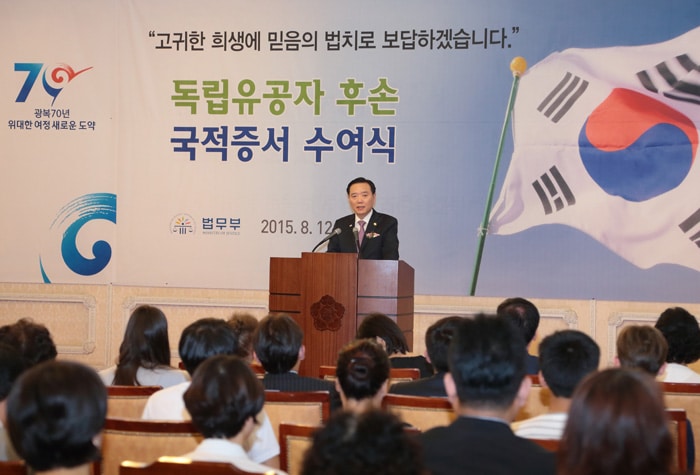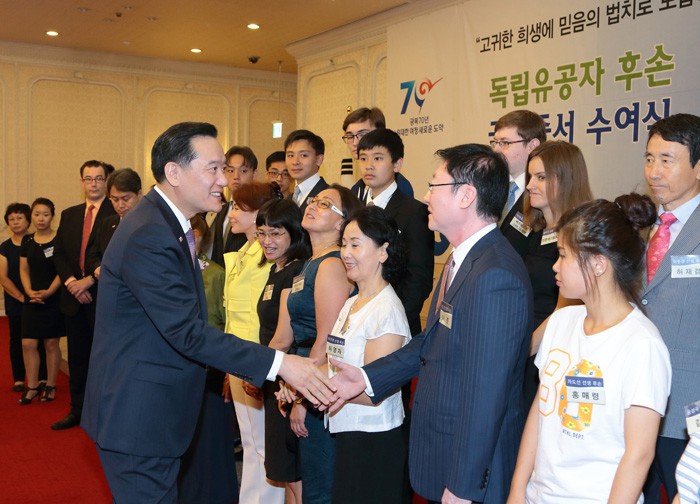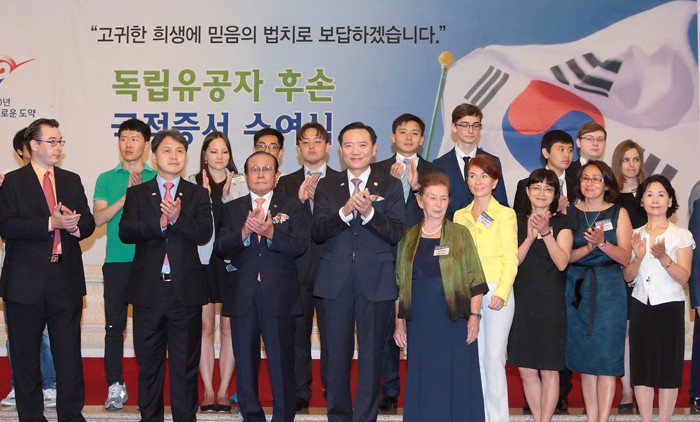Descendants of Korean independence activists living outside Korea have been granted Korean citizenship.
A ceremony was held at the government complex in Gwacheon, Gyeonggi-do Province, on Aug. 12 to grant nationality certificates to 30 descendants of independence activists.
The ceremony was held to embrace the descendants of independence activists as Korean nationals both in honor of the 70th anniversary of Korean independence and in order to express gratitude to them for the activities of their forebears who sacrificed themselves for the nation.

A ceremony is underway to grant nationality certificates to 30 descendants of Korean independence activists, at the government complex in Gwacheon, Gyeonggi-do Province, on Aug. 12.
Among the 30 recipients at the ceremony were descendants of Lee Wi-jong, of General Kim Gyeong-cheon, of Korea’s first Minister of Justice Lee In and of William Linton, among others.
Lee Wi-jong (1887-1917) was one of the three envoys sent by King Gojong (1852r. 1863-1919) to The Hague to appeal to the international community concerning the unfairness of the treaty Japan forced upon Joseon in 1907 that made Korea into a protectorate. Lee translated a lengthy document to submit to the First Hague Peace Conference in 1899. He also attended an international conference of journalists and gave a lecture, “A Plea for Korea,” to reveal and to condemn Japan’s aggression and use of force concerning the 1907 treaty.
General Kim Gyeong-cheon (1888-1942) sought exile in Manchuria in 1919 and became a drill instructor at the Sinheung Military School. He also took part in military action against Japanese colonial forces.
Former Justice Minister Lee In (1896-1979) tried to defend numerous independence activists, but he was arrested in 1942 for his involvement in a Korean language society. After independence, he became a prosecutor general and eventually justice minister.
William Linton (1891-1960) came to Korea as a missionary in 1912 and in 1919 helped write the Declaration of Independence and to make the first Taegeukgi, the national flag, as part of his support for the March First Independence Movement. He also contributed an article about the movement to overseas newspapers. He was forced to leave Korea in 1936 after refusing to worship at a Japanese shrine.

Minister of Justice Kim Hyun-woong shakes hands with descendants of independence activists during the ceremony.
Since 2006, the Ministry of Justice has granted Korean nationality to a total of 932 descendants, allowing them to go through special naturalization procedures and identifying new descendants every year.

Descendants of independence activists attend a ceremony to receive nationality certificates at the government complex in Gwacheon, Gyeonggi-do Province, on Aug. 12.
By Limb Jae-un
Korea.net Staff Writer
Photos courtesy of the Ministry of Justice
jun2@korea.kr























